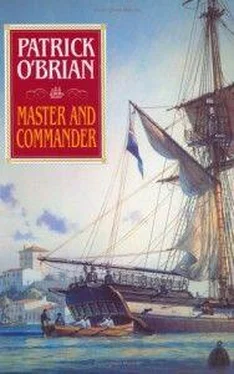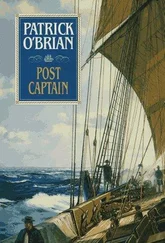The felucca was almost touching now, and a tame genet – a usual creature in Barbary craft, on account of the rats – stood on the rail, looking eagerly up, ready to spring.
An elderly Swede named Volgardson, the kindliest of men,
threw a swab that knocked it off its balance, and all the men along the side hooted and shrieked to frighten it away.
'Mr Dillon,' said Jack, 'we'll get the starboard tacks aboard.'
At once the Sophie sprang to life – bosun's calls shrilling, hands running to their places, general uproar – and in the din Stephen cried, 'I insist upon a boat – I protest…
Jack took him by the elbow and propelled him with affectionate violence into the cabin. 'My dear sir,' he said, 'I am afraid you must not insist, or protest: it is mutiny, you know, and you would be obliged to be hanged. Was you to set foot in that felucca, even if you did not bring back the contagion, we should have to fly the yellow flag at Mahon: and you know what that means. Forty mortal bloody days on the quarantine island and shot if you stray outside the pallisado, that is what. And whether you brought it back or not, half the hands would die of fright.'
'You mean to sail directly away from that ship, giving it no assistance?'
'Yes, sir.'
'Upon your own head, then.'
'Certainly.'
The log took little notice of this incident; it scarcely could have found any appropriate official language for saying that the Sophie's surgeon shook his fist at the Sophie's captain, in any case; and it shuffled the whole thing off with the disingenuous spoke felucca: and 1/4 past 11 tacked, for it was eager to come to the happiest entry it had made for years (Captain Allen had been an unlucky commander: not only had the Sophie been almost entirely confined to convoy-duty in his time, but whenever he did have a cruise the sea had emptied before him – never a prize did he take) …PM moderate and clear, up topgallantmasts, opened pork cask no. 113, partially spoiled. 7 saw strange sail to westward, made sail in chase.
Westward in this case meant almost directly to the Sophie's lee; and making sail meant spreading virtually everything she possessed – lower, topsail and topgallant studdingsails, royals of course, and even bonnets – for the chase had been made out to be a fair-sized polacre with lateens on her fore and mizen and square sails on her mainmast, and therefore French or Spanish – almost certainly a good prize if only she could be caught. This was the polacre's view, without a doubt, for she had been lying-to, apparently fishing her storm-damaged mainmast, when they first came in sight of one another; but the Sophie had scarcely sheeted home her topgallants before the polacre's head was before the wind and she fleeing with all she could spread in that short notice – a very suspicious polacre, unwilling to be surprised.
The Sophie, with her abundance of hands trained in setting sail briskly, ran two miles to the polacre's one in the first quarter of an hour; but once the chase had spread all the canvas it could, their speeds became more nearly even. With the wind two points on her quarter and her big square mainsail at its best advantage, the Sophie was still the faster, however, and when they had reached their greatest speed she was running well over seven knots to the polacre's six. But they were still four miles apart, and in three hours' time it would be pitch dark – no moon until half-past two. There was the hope, the very reasonable hope, that the chase would carry something away, for she had certainly had a rough night of it; and many a glass was trained upon her from the Sophie's fo'c'sle.
Jack stood there by the starboard knighthead, willing the sloop on with all his might, and feeling that his right arm might not be too great a price for an effective bow-chaser. He stared back at the sails and how they drew, he looked searchingly at the water rising in her bow-wave and sliding fast along her smooth black side; and it appeared to him that with her present trim the after sails were pressing her forefoot down a trifle much – that the extreme press of canvas might be hindering her progress – and he bade them take in the main royal. Rarely had he given an order more reluctantly obeyed, but the log-line proved that he was right: the Sophie ran a little easier, a very little faster, with the wind's thrust more forward.
The sun set over the starboard bow, the wind began to back into the north, blowing in gusts, and darkness swept up the sky from behind them: the polacre was still three-quarters of a mile ahead, holding on to her westward course. As the wind came round on to the beam they set staysails and the fore-and-aft mainsail: looking up at the set of the fore-royal and having it braced round more sharply, Jack could see it perfectly well; but when he looked down it was twilight on deck.
Now, with the studdingsails in, the chase – or the ghost of the chase, a pale blur showing now and then on the lifting swell – could be seen from the quarter-deck, and there he took up his stand with his night-glass, staring through the rapidly gathering darkness, giving a low, conversational order from time to time.
Dimmer, dimmer, and then she was gone: suddenly she was quite gone. The quadrant of horizon that had shown that faint but most interesting bobbing paleness was bare heaving sea, with Regulus setting into it.
'Masthead,' he hailed, 'what do you make of her?'
A long pause. 'Nothing, sir. She ain't there.'
Just so. What was he to do now? He wanted to think: he wanted to think there on deck, in the closest possible touch with the situation – with the shifting wind on his face, the glow of the binnacles just at hand and not the least interruption. And this the conventions and the discipline of the service allowed him to do. The blessed inviolability of a captain (so ludicrous at times, such a temptation to silly pomp) wrapped him about, and his mind could run free. At one time he saw Dillon hurry Stephen away: he recorded the fact, but his mind continued its unbroken pursuit of the answer to his problem. The polacre had either altered its course or would do so presently: the question was, where would this new course bring it to by dawn? The answer depended on a great many factors – whether French or Spanish, whether homeward or outward bound, whether cunning or simple and, above all, upon her sailing qualities. He had a very clear notion of them, having followed her every movement with the utmost attention for the last few hours; so building his reasoning (if such an instinctive process could be called by that name) upon these certainties and a fair estimate of the rest, he came to his conclusion. The polacre had worn; she might possibly be lying there under bare poles to escape detection while the Sophie passed her in the darkness to the northward; but whether or no, she would presently be making all sail, close-hauled for Agde or Cette, crossing the Sophie's wake and relying on her lateen's power of lying nearer to run her clear to windward and so to safety before daylight. If this was so the Sophie must tack directly and work to windward under an easy sail: that should bring the polacre under her lee at first light; for it was likely that they would rely on their fore and mizen alone – even in the chase they had been favouring their wounded mainmast.
He stepped into the master's cabin, and through narrowed, light-dazzled eyes he .checked their position; he checked it again with Dillon's reckoning and went on deck to give his orders.
'Mr Watt,' he said, 'I am going to put her about, and I desire the whole operation shall be carried out in silence. No calls, no starting, no shouts.'
'No calls it is, sir,' said the bosun, and hurried off uttering 'All hands to tack ship,' in a hoarse whisper, wonderfully curious to hear.
Читать дальше
Конец ознакомительного отрывка
Купить книгу












